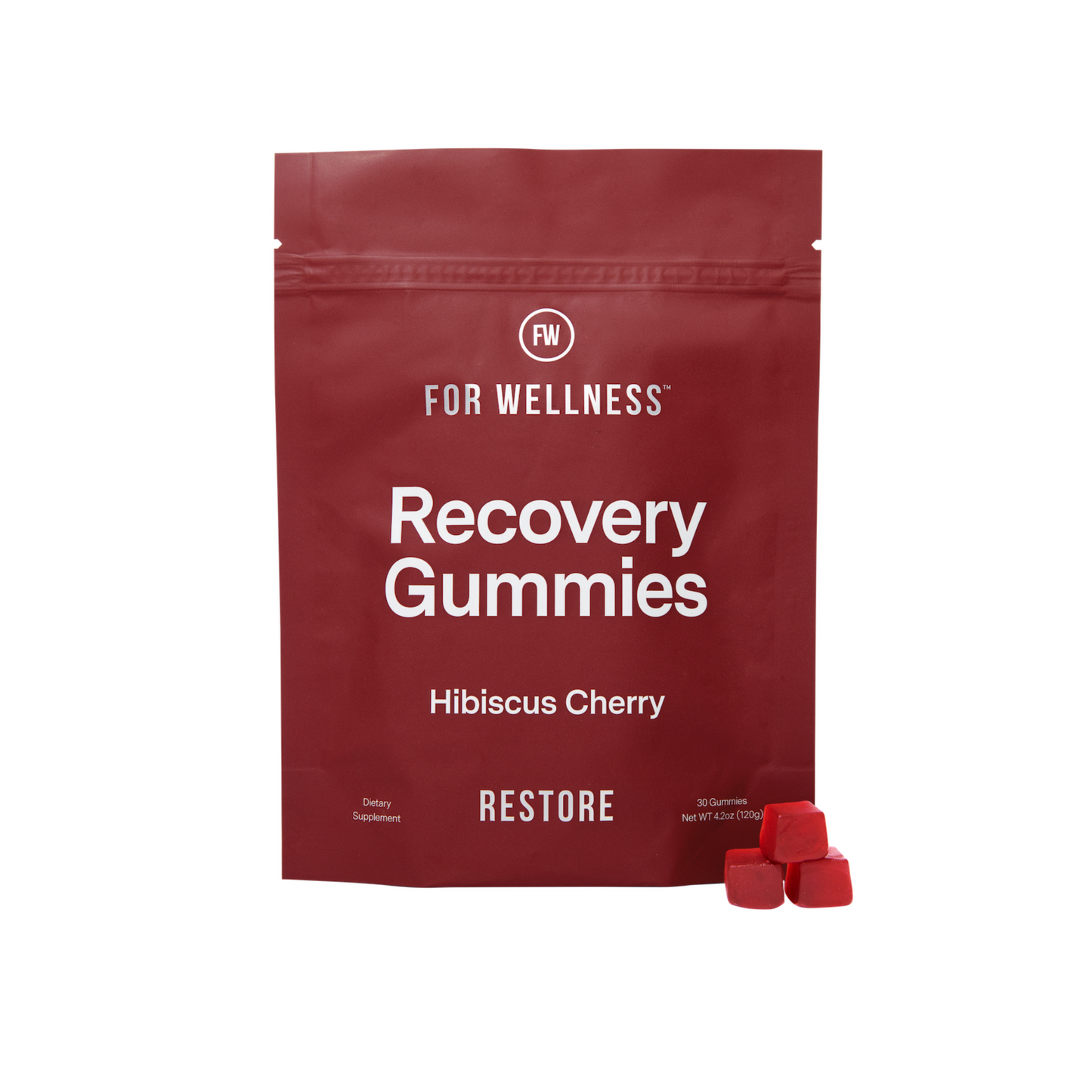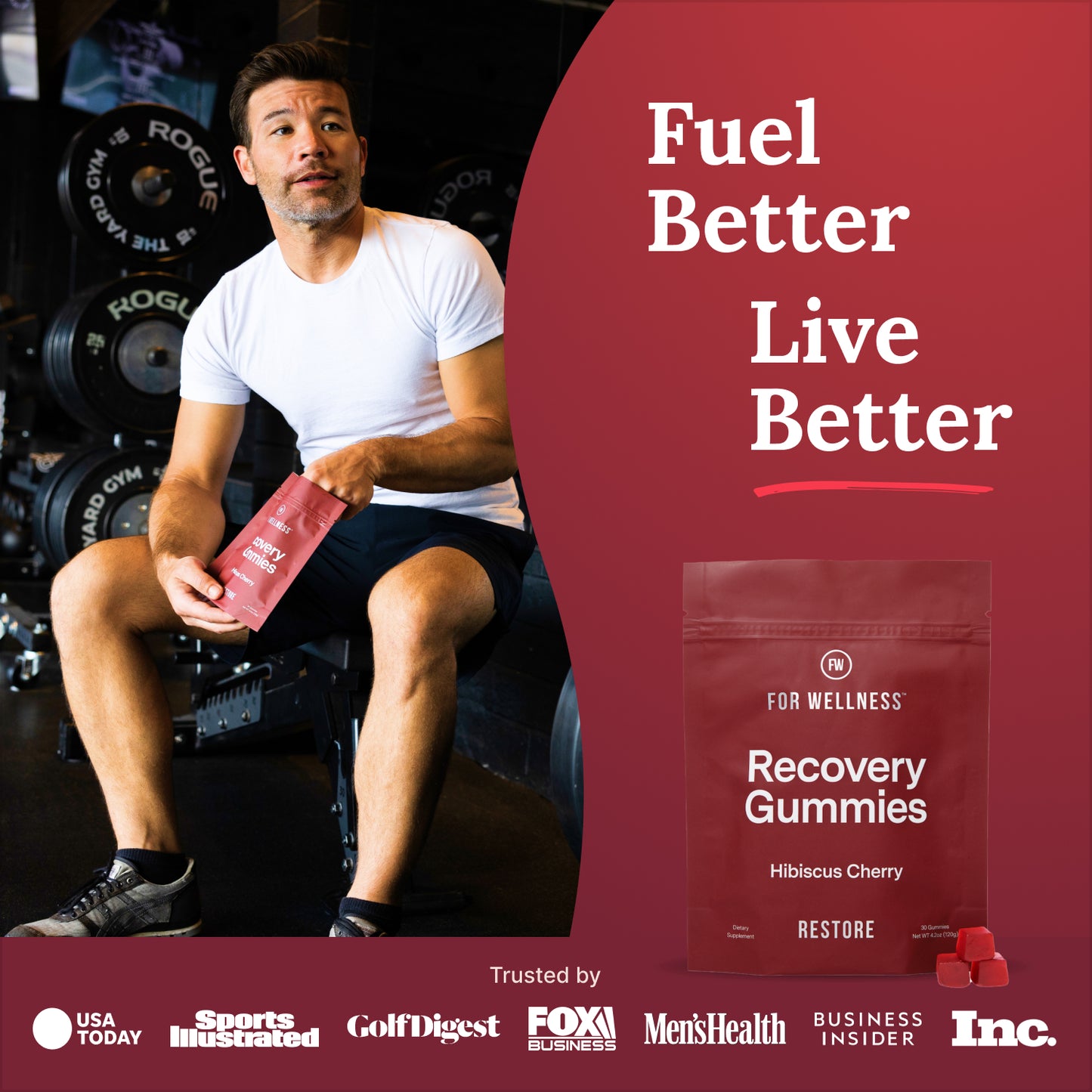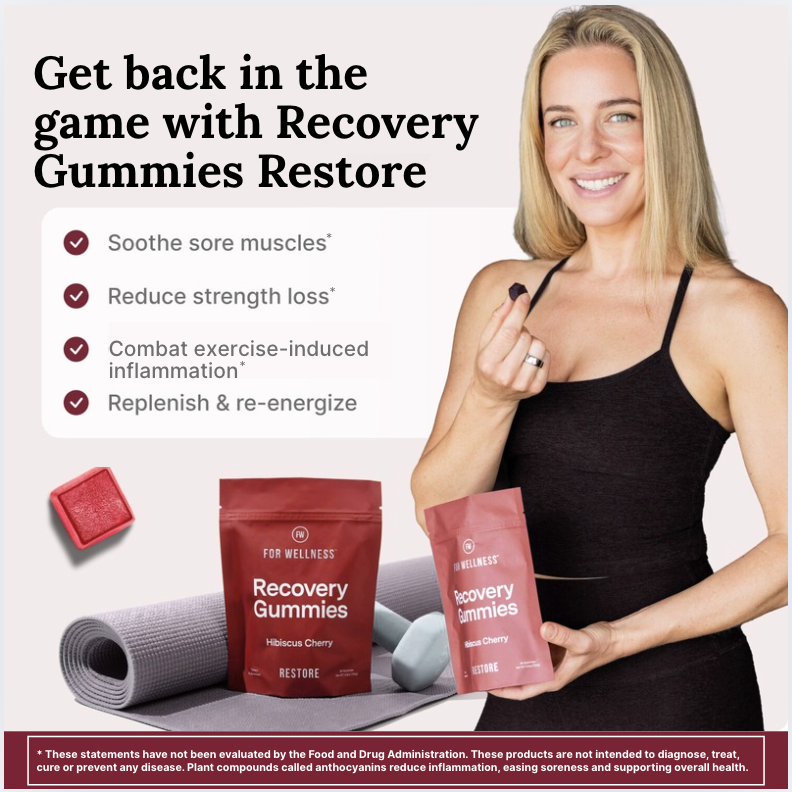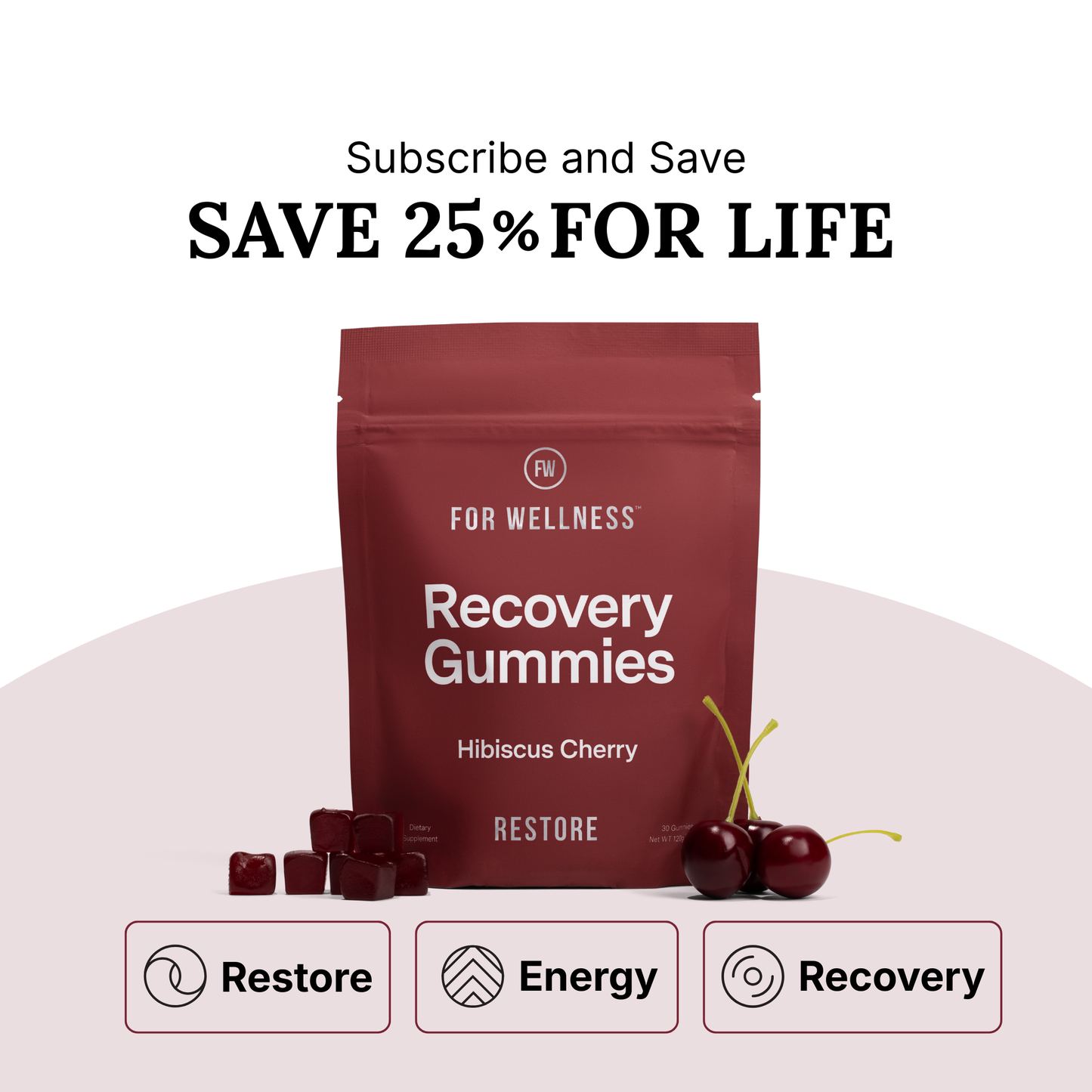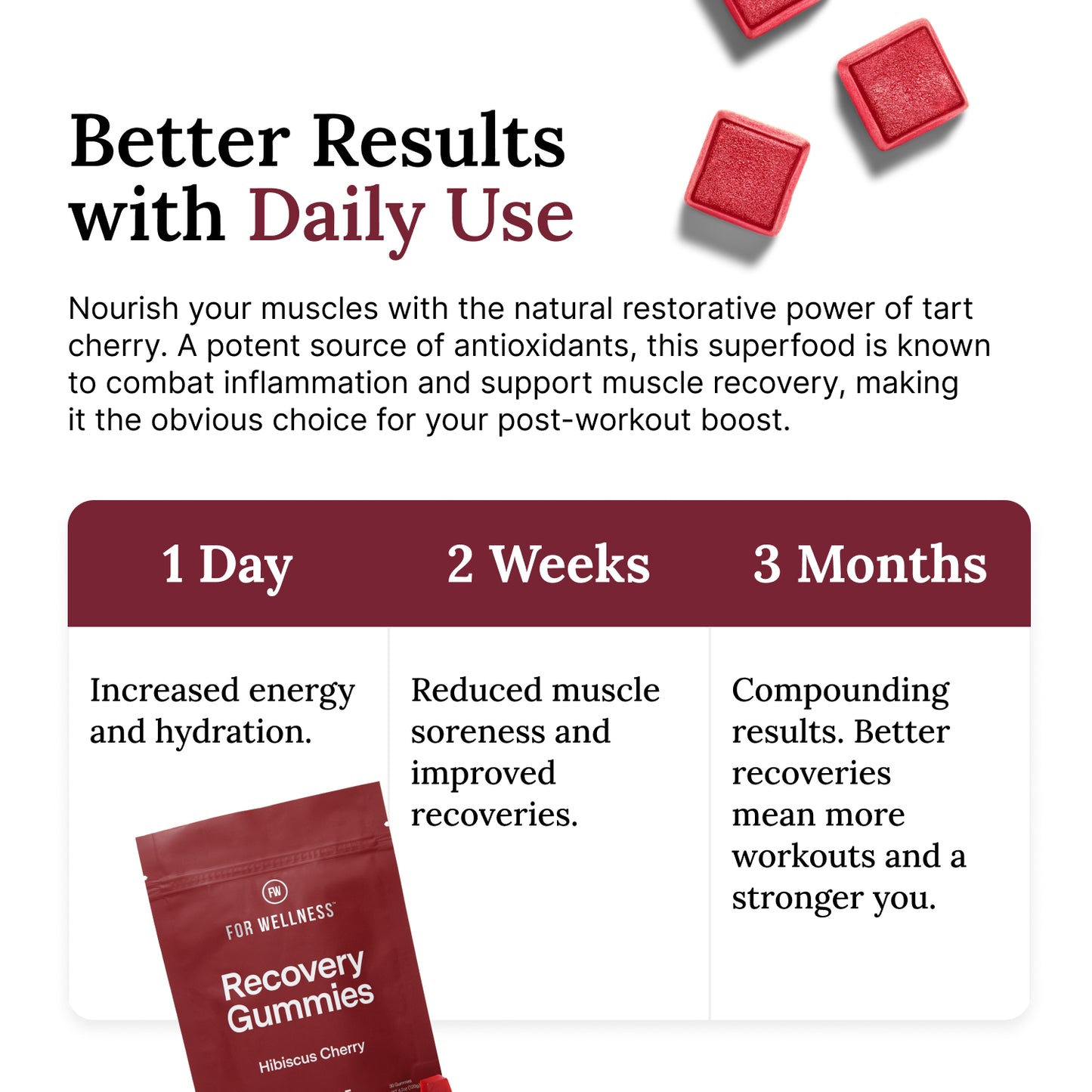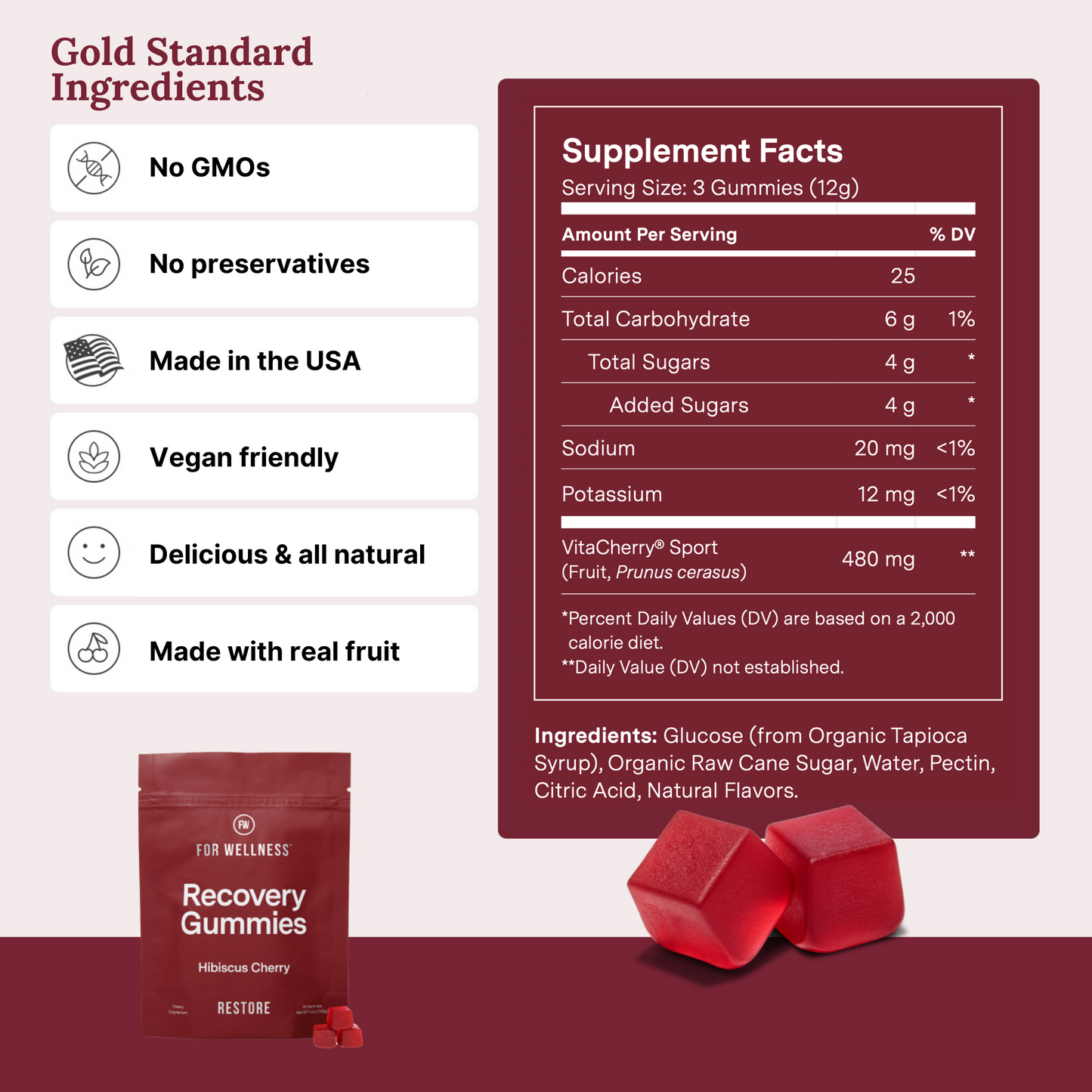Did you know you can lose as much as 100 oz of fluid during exercise?
While it's great to get your sweat on, ensuring this doesn't come at the cost of your physical well-being is equally essential.
As you'll soon see, water plays a crucial role in your body's functions - perhaps even more than you think - so maintaining fluid levels is vital to staying healthy.
Want to learn how you can perfect the art of hydration post-exercise? We've got you covered!
Read on for the whole story.


Recovery Gummies - Hydrate
-
Full of antioxidants and replenishes electrolytes.
-
Boosts energy with all-natural ingredients.
-
Tastes incredible with juicy blueberry flavors.
The Muscular System and Water
The human muscular system is a complex network of tissues that plays a critical role in the body's structure and movement. It comprises over 600 muscles, categorized into three primary types: skeletal, smooth, and cardiac.
Skeletal muscles are responsible for voluntary movements such as walking or lifting. You can find them attached to the bones and tendons.
Smooth muscles are in organs like the stomach and blood vessels, and they work involuntarily to control actions such as digestion.
Cardiac muscles, found exclusively in the heart, keep the heart pumping blood throughout the body.
All these muscles work in harmony to facilitate a range of movements and functions vital to our everyday lives.
The Role of Water in Muscles
Water is an essential component of the muscular system. Muscles are composed of approximately 75% water, indicating just how important it is to keep up your fluids.
One of the pivotal roles that water plays in muscle function is the transportation of nutrients. Muscles require various nutrients such as proteins, carbohydrates, vitamins, and minerals to function, and water helps facilitate this.
Carrying Nutrients
Water serves as a medium through which these nutrients are carried to the muscle cells in the bloodstream. This is crucial for providing the energy needed for muscle contraction and repairing muscle tissues after exercise.
Adequate hydration aids in removing waste products like lactic acid, which can accumulate in muscles during intense activity and contribute to muscle soreness.
Joint Lubrication
Another significant function of water is joint lubrication.
Our joints consist of our bones covered in a layer of cartilage, which, as you can imagine, would be pretty painful without anything to smooth out their friction.
That's where synovial fluid comes into play.
Made mainly of water, synovial fluid keeps your joints lubricated for flexibility and movement.
When dehydrated, your body struggles to make this fluid, which can cause joint pain.
Regulating Body Temperature
Water also plays an integral role in regulating body temperature, particularly during physical activity.
As muscles contract during exercise, they generate heat.
To prevent the body from overheating, it needs a mechanism to release this heat, AKA sweat. Water in sweat is brought to the skin’s surface, where it evaporates, releasing heat, and cooling you off.
However, this mechanism comes at the cost of water in your body, so you must be aware of when you're losing water and replenish it appropriately.
Plus, without adequate hydration, the body’s ability to regulate temperature through sweating is compromised, leading to an increase in core temperature, which can adversely affect muscle performance.
The Process of Dehydration
It's essential to recognize that even mild dehydration can significantly impact physical performance.
Being mindful of the environment in which you are exercising and adjusting hydration strategies accordingly will help prevent dehydration.
Maintaining hydration is about quenching thirst and ensuring the body is equipped with the resources it needs for optimal performance and health.
What Is Dehydration?
Dehydration refers to a state where the body loses more fluids than it takes in, resulting in inadequate water to carry out its normal functions.
When water input and output balance is skewed towards loss, various physiological processes can be adversely affected. This imbalance impacts general health and is detrimental to physical performance.
If there's insufficient water to perform these roles effectively, individuals may experience symptoms such as dry mouth, fatigue, dizziness and confusion, and loss of consciousness.
Causes of Dehydration
During exercise, the risk of dehydration increases substantially. There are several causes for this heightened risk.
The body generates heat when muscles are active, and to regulate its temperature, it relies on sweating as a cooling mechanism. As sweat evaporates from the skin’s surface, it helps to cool the body but also leads to losing fluids.
Heavy breathing during exercise also causes a loss of water through exhaled air. These losses can increase in hot or humid conditions, where sweating is more profuse.
At high altitudes, where the air is drier, increased respiration can lead to the need for more water.
How Does Dehydration Affect the Muscles?
When dehydrated, reduced performance in muscle activity is one of the most immediate consequences.
Water is integral to the process of energy production within muscle cells. Without adequate water, blood volume decreases, reducing muscle oxygen supply.
This, in turn, impacts the muscles' ability to produce energy efficiently.
The transport of essential nutrients to the muscle cells is compromised, impacting functions like strength, coordination, and endurance.
Increased Fatigue
When insufficient water is in the body, the heart has to work harder to pump blood through the circulatory system. This places an additional strain not only on the heart but also on the muscles which are already working hard during physical activity.
The accumulation of metabolic waste products such as lactic acid in the muscles, usually flushed out by proper hydration, can contribute to tiredness and muscle fatigue.
A dehydrated individual may feel physically exhausted much sooner than adequately hydrated.
Muscle Cramps
When the body loses fluids, it also loses electrolytes, minerals like potassium, sodium, and calcium that help regulate muscle contractions.
With decreased electrolyte levels, muscles may involuntarily contract and fail to relax properly, leading to muscle cramps. These cramps can be painful and hinder physical performance.
If the body continues to lose fluids and electrolytes without adequate replenishment, there is a risk of more severe muscle issues such as heat cramps. These are painful, involuntary muscle spasms during intense exercise in hot environments.
Proper hydration and electrolyte balance prevent muscle cramps and promote muscle function.
Understanding Electrolytes: What Are Electrolytes?
Electrolytes are minerals in the body that carry an electric charge when dissolved in water. These charged minerals are essential for many physiological processes, including maintaining fluid balance, supporting muscle contractions, and regulating nerve function.
Because they are dissolved in bodily fluids such as blood, urine, and sweat, the balance of electrolytes can be affected by hydration levels. It is vital to focus on water intake and ensure that the body has an adequate supply of electrolytes, especially during intense physical activity or sweating.
Sodium
Sodium is one of the most prominent electrolytes in the human body and helps regulate the amount of water in and around your cells.
In muscle function, sodium is essential for muscle contractions and also plays a role in nerve impulses necessary for voluntary muscle movements.
During exercise, sodium is lost through sweat, and not replacing it can lead to hyponatremia. It is a condition characterized by low sodium levels that can negatively impact muscle function and overall health.
Potassium
Potassium is another essential electrolyte that works closely with sodium to maintain fluid balance, regulate blood pressure, and support proper muscle function.
It is also crucial for the transmission of nerve impulses. Potassium helps to regulate the balance between intracellular and extracellular fluids. A potassium deficiency can cause muscle weakness, cramps, and fatigue.
Like sodium, potassium is also lost through sweat during exercise, making it essential to replenish levels, particularly after intense physical activity.
Magnesium
Magnesium is a multifunctional electrolyte that involves over 300 enzymatic reactions in the body and helps your muscles relax by moving calcium out of your muscles.
This is also how magnesium prevents muscle cramps and spasms.
Magnesium is also involved in producing adenosine triphosphate (ATP), a molecule that provides energy for muscle contractions.
Calcium
Calcium, often associated with bone health, is also a vital electrolyte for muscle function. When a muscle is stimulated to contract, calcium is released within the muscle cell, facilitating the movement.
Your heart muscle contractions depend on calcium, which regulates your heartbeat to keep things ticking along smoothly.
How to Stay Hydrated
When planning your exercise routine, being proactive is the best way to ensure you stay hydrated.
Embed hydration in your routine by factoring water into your rest breaks and drinking water while preparing to work out.
Ideally, consuming about 16 to 24 ounces of water two to three hours before activity gives the body adequate hydration levels at the start. Sipping an additional 8 ounces of water approximately 15 to 30 minutes before exercise also helps.
While exercising, aim for 7 to 10 ounces of water every 10 to 20 minutes; bear in mind this recommended amount can vary depending on factors such as the intensity of the exercise, environmental conditions, and individual sweat rates.
Post-exercise hydration is equally important, as it aids in workout recovery. Drinking about 16 to 24 ounces of fluid for every pound of body weight lost during the activity is recommended.
Adding electrolytes to the post-exercise hydration routine helps replenish the minerals lost through sweat. In addition to water, electrolyte supplements are a great way to expedite the return of those crucial elements to your body.
Listening to your body and recognizing the signs of thirst are also essential, but it's important to note that thirst is not always an early indicator of dehydration, so drink fluids at regular intervals to be sure you're getting enough water.
Try Getting Technical
Hydration Apps
There's a world of apps and gadgets out there that can remind you regularly when to have a glass (or more) of water. Given that many of us have our phones on us at all times, this is perfect for ingraining water into your routine.
There are also apps that take into account things like your body weight and exercise routine for a more accurate read.
Water Bottle Choice
Okay, maybe an app is a bit fiddly for you when it comes to remembering to drink water.
Why not consider getting a large water bottle and using an erasable marker to write on your bottle the times at which you'd like to have consumed a certain amount of water? This will help you consume water steadily and track exactly how much you've drunk.
Habits, Habits, Habits!
Think of something you do regularly, and attach drinking water to it.
For example, if you have two coffees daily, drink 8 oz of water every time you grab a coffee.
Eventually, it'll be second nature to be filling up your drink bottle.
Hydration Strategies to Recover from a Workout
Designing hydration strategies based on the type of exercise can significantly enhance performance and workout recovery.
Here's how one can tailor hydration plans according to different exercise types:
Low Intensity: Yoga and Walking
For such activities, water is typically sufficient to maintain hydration. One should aim to drink water before starting the exercise and sip on it throughout the activity as needed.
Post-exercise, water or a piece of whole fruit (which also contains water and replenishing electrolytes) can effectively restore hydration levels. A healthy smoothie can also help restore your levels.
Moderate Intensity: Weightlifting, Cycling, Casual Running
Water should still be the primary source of hydration. However, if the workout lasts more than an hour or leads to excessive sweating, a beverage with electrolytes like coconut water can be beneficial.
Post-workout, it’s crucial to replenish the electrolytes and water lost through sweat. A balanced snack that includes water-rich fruits or vegetables and proteins for muscle recovery is the way to go.
High Intensity: Marathon Running, Intense Interval Training, Long-Distance Cycling
A more comprehensive hydration strategy is needed for workouts that are highly intense or last longer than an hour.
Water alone might not be enough to replenish the fluid and electrolytes lost through heavy sweating. Electrolyte supplements are particularly useful in these scenarios, as they contain both electrolytes and carbohydrates for energy. During exercise, aim to consume fluids to prevent dehydration and maintain energy levels regularly.
Post-exercise, promptly replace lost fluids and electrolytes and consume high-quality protein to aid muscle recovery.
Rehydrating and Replenishing Electrolytes Post-Exercise
To effectively rehydrate and replenish electrolytes after exercising, it's not just about your water! Plenty of foods also contain a bunch of electrolytes, including bananas, sweet potatoes, nuts, and dairy products.
Weighing yourself before and after exercise will help you estimate how much fluid you lose and how much needs to be consumed for adequate rehydration.
You should also be vigilant for signs of dehydration and electrolyte imbalances so you can pick up on your body's signs it needs more support.
Several signs can indicate whether an individual is dehydrated or has an electrolyte imbalance post-exercise, including muscle cramps or spasms, muscle weakness, twitching, and irregular heartbeat. In some cases, you may also feel nauseous or confused.
Are You Staying Hydrated?
Staying adequately hydrated and replenishing electrolytes is much more than just quenching your thirst; it's about supporting the body’s vital functions and optimizing performance and recovery.
By understanding the anatomy and functions of muscles, the role of water in muscle activity, and the essential nature of electrolytes, individuals can make informed choices that contribute to their fitness and overall well-being.
Are you looking for products that can help you stay hydrated? Shop our products today.



